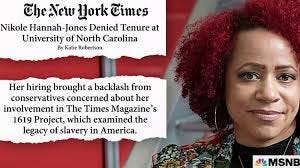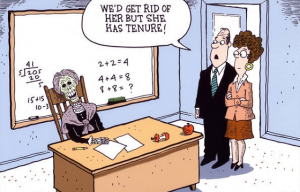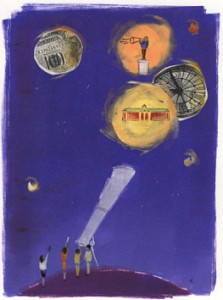Conservative assaults on higher education are nothing new. Recall George Wallace’s vitriol about “pointy-headed intellectuals” in the late 1960s. Years before then, in 1952, William F. Buckley Jr. earned his spurs with the book “God and Man at Yale,” lambasting universities for straying from his dearly held Christian principles. That same year, the House Un-American Activities Committee investigated Communist methods of infiltration in education, as political analyst Pam Chamberlain explained in “The Right v. Higher Education: Change and Continuity.”
Indeed, it has become an article of faith in conservative circles that universities are dominated by lefties who don’t educate, but who indoctrinate. Ronald Reagan in his first gubernatorial campaign in 1966 stoked conservative hostility toward the University of California schools, particularly UC Berkeley, which was a center of demands for free speech on campus and a locus protest against the Vietnam war. After his attacks succeeded, and he forced the schools into a position of needing to charge tuition for the first time in their history.
Unlike these scattered efforts, however, today’s conservative movement is mounting well practiced and orchestrated assaults on what its supporters see as rampant liberalism in education. These drives are led by governors and lesser politicians who in calculated campaigns have won elections or appointments to boards of regents and higher education panels, particularly in red states.
Florida Gov.Ron DeSantis epitomized the drive in 2021 when he signed legislation designed to crack down on a perceived bias in the classrooms by requiring schools to survey themselves annually to measure “intellectual freedom and viewpoint diversity” on their campuses. He followed up early this year by packing the board at the New College of Florida with rightists determined to remake the campus and squash liberal viewpoints there.
He’s hardly alone, however. Other officials have driven out educators they believe would espouse values they can’t stomach, especially on matters of diversity, equity and inclusion (which evidently are values they can’t abide. Consider the actions of the U.S. Supreme Court against affirmative action in university recruitment).
Most notable here are the cases of two distinguished New York Times journalists who, perhaps not coincidentally, were Black women:
— Nikole Hannah-Jones, whose leadership of the 1619 Project earned a Pulitzer Prize, was appointed in 2021 as the Knight Chair in Race and Investigative Journalism at the University of North Carolina’s Hussman School of Journalism and Media. But, after she was denied tenure by conservative trustees, she decamped to Howard University.
— And this year Texas A&M University drove out former New York Times editor and tenured University of Texas professor Dr. Kathleen McElroy as the new head of the journalism department. After announcing her appointment to a tenured spot, the school’s leaders steadily chipped away at the terms, eventually offering her a nontenured one-year position as a professor of practice with three years as the program director, serving at will. She refused and the university wound up settling with her for $1 million.
An alumni group had agitated against McEloy’s hire, balking at her reported advocacy of DEI. Regents echoed the worries. As The Chronicle of Higher Education reported, one regent texted the chancellor: “I thought the purpose of us starting a journalism department was to get high-quality Aggie journalist [sic] with conservative values into the market.” He wrote: “This won’t happen with someone like this leading the department.”
Take note: the regent didn’t argue for distinguished journalism chops and a commitment to such verities in the field as fairness, thoroughness and accuracy. No. Instead, he applied an ideological test, demanding “conservative values.” Indeed, for conservatives in Texas, McElroy’s affiliation with The New York Times was hardly a plus. It was as if she had worked for Pravda, McElroy said an official at the school told her.
While often underhanded – as when schools chip away at offers that right-wingers object to – some of the assaults are simply dishonest. A flap this year at Arizona State University, for instance, included an official blaming the university for eliminating her position at the school, when in fact her job went away after a funder — a conservative — pulled his support for her center. The donor was offended when faculty members objected vocally to a couple right-wing speakers coming on campus.
And, sometimes, well-regarded academics who personally may be conservative themselves are victims of the assaults — presumably because they aren’t conservative enough. At the University of Nebraska-Lincoln, where I taught for 14 years, rightists led by then-Gov. Pete Ricketts attacked Chancellor Ronnie D. Green after he led an effort to promote diversity and inclusion at the school. Green, who grew up on a farm in Virginia, made his academic bones in agriculture and was known for his Christian religious commitments, wound up retiring this year as chancellor after just seven years, at age 61.
Aside from such examples, the efforts by conservatives to remake higher education have drawn heat from such groups as the American Association of University Professors. In a recent statement, the AAUP and the American Federation of Teachers condemned the efforts. Their statement said: “Right-wing lawmakers continue to wage a coordinated attack against public colleges and universities with legislation that would undermine academic freedom, chill classroom speech and impose partisan agendas on public higher education.”
The groups cited legislation introduced in at least 23 states that would limit teaching about race gender and sexual orientation, require intellectual and viewpoint diversity statements and surveys, cut funding for diversity, equity and inclusion efforts, and end tenure for faculty. As the groups said, “This legislation is the latest in a multiyear effort by right-wing activists and donors to reshape academia to its liking.”
These efforts come against a backdrop in which many Americans, particularly Republicans, feel hostile to university educations. According to Gallup, only 36% of Americans have “a great deal” or “quite a lot” of confidence in such schooling Among Republicans, only 19% of Americans expressed such sentiments. Given such feelings, academics who hope the public will back them in fights to preserve tenure, for instance, may be sorely disappointed.
Finally, let me share a personal anecdote. I once gave a college tour to a young man who was quite hesitant about entering the University of Nebraska-Lincoln. He told me he feared that his Christian faith would be challenged at the school, despite an abundance of churches on campus. He was trying to figure out if a small Christian college, where he would find reinforcement, would be a better fit for him. I recall thinking a few things: university should be a place where many of one’s ideas as a teenager should be tested (although I doubted his Christian commitments would be), and two, his faith must be a fragile thing, indeed, if it can’t hold up to exposure to people who may believe differently.
And yet, that young man may may be representative of much of the sentiment that has coursed through the right since at least the days of William F. Buckley Jr., before conservatives hit upon the approaches they are taking now.
Today’s assaults may owe their genesis to the isolated attacks of prior decades. But, nowadays, they are well-organized and well-developed. And in a troubling number of cases they are working.






